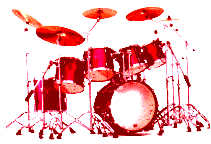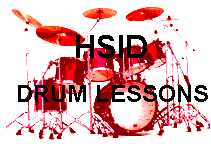|
Downloads *
Drummers Trivia *
Drummers Chat Rooms *
Rudiments *
Digital Music *
Knowledge Assessments *
TD Archives *
Drum Set Buyers Guide *
Bass-Player Jokes *
Assembling a Drum Set *
Parts of a Drum Set *
About HSID *
Video Troubleshooter
Bill Powelson's School of Drums
School of Drums
Back to the Tempo Dispatch Archives
Issue #9___\__\__\__\__\__________/__/__/__/__/ September 97
___________________________________________________
TABLE OF CONTENTS
What is in this issue?
Contents:
1. Feature Article: CUT-TIME 2/4 (POLKA)
2. Bar Jokes of the Month
________________________________________________________
FEATURE ARTICLE
September 1997
POLKA BEATS: PART I
Before you decide this months lesson topic is boring,
WAIT!!! Polka is more important than you think! Much of the
90s alternative and progressive rock styles are based on what
has been formerly known as the POLKA beat. This beat is happening
right now on a radio dial somewhere near and dear to your heart!
I promise!
My point?
All drummers in every music style will need this beat
eventually! POLKA is the old 'street' name for cut-time 2/4.
It is also almost identical to what I call Quarter-note 4/4.
Quarter-note 4/4 is enjoying a surge in popularity at this
particular moment in time. This lesson will help you get
a handle on all those very tricky songs that fall into the
Cut-Time 2/4 (POLKA) / Quarter-Note 4/4 category.
First, we need to understand that all the beats in
this lesson are classics and they will countinue to be used
long after the POLKA (or alternative) names have faded
into oblivion.
POLKA was/is a popular dance . . . My dictionary
says it this way.
POLKA:
1. a lively couple dance of Bohemian origin.
2. a piece of music for such a dance.
[ Czech: lit., Polish woman]
Hmmmmm! That's interesting! That last part has me
scratching my head!
The truth is, after you learn to play this beat
pattern, the realization will hit you that this beat is
all around you. It is the underlying pattern in many of
the top 100 songs of the 90s. You need this beat more
than it needs you!
We will start very simply here but the beats at
the bottom of the lesson will tax even the more polished,
advanced players. So, in short . . . this lesson contains
something for everyone from the most basic beginning
students to the monster drummers. Go as far as you can
with this material then put the rest on a back burner until
such a time that your co-ordination is ready to proceed!
NOW, ON WITH THE LESSON:
POLKA: PART I (Cut time 2/4)
The most basic of polka beats:
COUNT:
1 2
S Snare (Right hand)
B Bass (Right foot)
Almost anyone could play the above beat pattern.
It is simply, foot-hand-foot-hand played repeatedly at
a VERY rapid clip. This beat is geared for the fastest
songs you will ever play. If you can't keep up any other
way . . . use the above pattern! Otherwise, this one is
considered to be pretty lame. We're only using one hand
and one foot, here!
We will get back to other (more complex) snare and
bass examples later in the lesson but before we do that,
I want to show you the easiest and most common 'cheater'
forms of the beat. True 'POLKA' beats are most often played
without the use of a steady hi-hat. They are usually played
with both hands on the snare at a tempo reminiscent of a roll.
More on that, later . . .
NEXT, WE WILL PLAY POLKAS USING THE HI-HAT!
COUNT:
1 2
X X Closed hi-hat (Right hand)
S Snare (Left hand)
B Bass (Right Foot)
We just added the other hand. The Xs (on the hi-hat)
will be on the right hand for all right handed players.
A LITTLE TOUGHER . . .
COUNT: Say 'an' for '&'
1 2&
X X Closed hi-hat
SS Snare
B Bass
Look closely! The second snare note is in-between
the steady, repeating, cymbals. In other words it is a syncopated
note. As more of these syncopated notes are added, your
speed with the rhythms will decrease proportionally, proving you
are actually humanoid after all.
Start slowly and build to peak speeds, gradually.
Repeat it as rapidily as possible!
That's not fast enough! Faster! Faster! Faster!
Repeat it until it smokes!
Now it is starting to sound more and more like a
POLKA. If you are a Country music fan, a few Johnny Cash songs
may come to mind. Don't laugh kids, 'Green Day' and 'Blink-182' use
this beat and others like it, all the time too. Jazz buffs? Yep! It's
everywhere. Jazz drummers tend to often play this pattern with brushes.
If a song is really, really fast, listen for different forms of this beat. It
will most likely be in use.
MONSTER DRUMMERS ONLY: (This is very hard to play fast)
COUNT:
1&2&
X X Closed hi-hat
SS Snare
BB Bass
In the example above, you are actually playing a
double stroke roll between the bass and snare, against
quarter notes on the hi-hat. It isn't easy but it is
great practice for all levels. Don't be a wimp! Work
on it until you can smoke it at blazing tempos.
CLASSIC POLKA: PART II
These are snare & bass (only) beat patterns.
We won't be using the hi-hat. Let's start with the
easy one we did earlier.
The most basic of polka beats. Yes, we did this
at the top of the lesson, but we'll take it in a different
direction, this time.
COUNT:
1 2 (Bass & Snare only, no hi-hat)
S Snare
B Bass
These next few patterns will be using both hands
on the snare so we need to change the code a little:
R = Right on snare
L= Left on snare
TRY THIS:
COUNT:
1 2
L RR Snare
B Bass
Build speed gradually!
THE PATTERN ABOVE WORKS OK AS A POLKA:
(But we can still do more . . .)
The plot thickens . . .
COUNT:
1 & 2 &
L L R R Snare
B Bass
THE PATTERN ABOVE IS A CLASSIC POLKA:
(But it still isn't complete. We need to accent
the backbeat!)
Keep doing it . . . but as you gather control,
try to begin accenting the backbeat on the count of 2.
Notice the little'<' above the 2. It means you are to accent
that note or play it louder than the other notes.
CODE: < = Accent
COUNT:
<
1 & 2 &
L L R R Snare
B Bass
It helps to hear these beats! Paid students will see
this lesson magically appear at the hidden website very soon.
It will appear with REAL notation and midi sound files.
SPECIAL NOTICE!!!!
More food for thought, (and EXTRA LONG hours of practice.)
There are at least three other forms of the final polka
beat above.
Try changing the stroke patterns these 3 other ways . . .
R R L L
R L R L
L R L R
The bass drum will always fall with the first note and
the count of 2 will always be accented, no matter which stroke
pattern is in use. Work with all four patterns, then use the one
that seems easiest for you.
________________________________________________________
|________________________________________________________|
BAR JOKES OF THE MONTH
A horse walks into a bar. The bartender says,
"Why the long face"?
Ba-dap-boom-crash
An elephant walks into a bar. The bartender says,
"Why the long face"?
Ba-dap-boom-crash
A hamburger walks into a bar. The bartender says,
"Sorry?! We don't serve food here"!
Ba-dap-boom-crash
A duck walks into a bar and orders a martini. The
bartender says, "Will you pay for this now"? The
duck says, "Nah, just put it on my bill"!
Ba-dap-boom-crash
Thanks for all the smiles John!
________________________________________________________
|________________________________________________________|
THE WINNING SECRETS ARE BURIED HERE.
END OF TEMPO DISPATCH #9 September, 1997

Copyright Bill Powelson 1994 all rights reserved.
|



